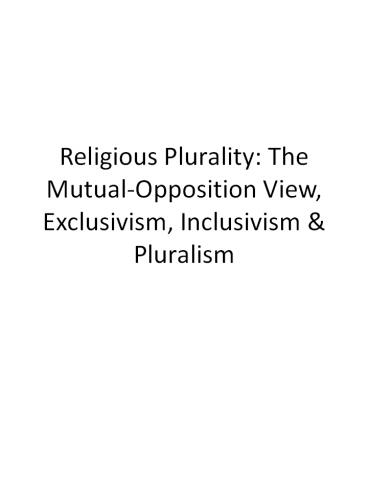Religious Plurality: The Mutual-Opposition View, Exclusivism, Inclusivism - PowerPoint PPT Presentation
1 / 10
Title:
Religious Plurality: The Mutual-Opposition View, Exclusivism, Inclusivism
Description:
The view that holds that religious plurality shows that no ... Obj: Doesn't exclusivism inevitably support an arrogant attitude towards other religions? ... – PowerPoint PPT presentation
Number of Views:311
Avg rating:3.0/5.0
Title: Religious Plurality: The Mutual-Opposition View, Exclusivism, Inclusivism
1
Religious Plurality The Mutual-Opposition View,
Exclusivism, Inclusivism Pluralism
2
The Fact of Religious Plurality
- It is an obvious fact that there are a plurality
of religions in the world - Although there are some overlapping teachings of
these groups (eg. Golden Rule), there are also
teachings that seem to logically contradict each
other (eg. The ultimate is personal vs.
impersonal we each lead one life vs. we each
lead multiple lives, etc) - What is the reason for plurality?
3
Mutual-opposition View
- The view that holds that the fact of religious
plurality shows that no religion is right, or at
least that there is no reason to accept one
religion over any other - David Hume presents this position when he
suggests that contending miracle claims of
religion indicates that none of them can be
founded in truth - The reason for plurality is (atheism) or might be
(agnosticism) that all religions simply represent
a multiplicity of made-up beliefs (i.e.
falsehoods)
4
Exclusivism
- The view that holds that ones religion alone is
right and other religions that differ from it are
excluded from being right - Objection Doesnt exclusivism imply that one
should adopt an arrogant attitude towards other
religions? - Objection How can one be so confident that one
has the truth? - Objection How can it be fair to condemn people
merely for holding incorrect metaphysical beliefs?
5
Responses to Objs 1 and 2
- As long as one believes in the possibility of
truth and logic, then arrogance is
unavoidableand this is true of the mutual
opposition view too. Also, most major religions
have principles that require certain degree of
tolerance and respect of religious difference - There is a difference between knowing the truth
and believing in the possibility of knowing the
truth (eg. as provided by some major
epistemological theory)one can question belief
in the former, without having to question belief
in the latter
6
Response to Obj 3Two Types of Exclusivism
- right in the truth-claim sense
- Simple expression of the basic logical principle
that logically contradictory ideas cannot both be
true (aka the law of the excluded middle) - right in the religious attainment sense
- the belief that salvation or enlightenment
depends on holding right beliefs (knowing the
truth should always be seen to matter) - These views can be held together, but need not
beSome defend 1 but reject 2 (eg. Inclusivists)
7
Inclusivism
- The view that ones religion alone can be right,
but that other religions may participate in its
rightness and so are included - Thomas Aquinas argued that salvation was not just
premised on explicit beliefs but also implicit
beliefs - Karl Rahner is a Catholic Theologian of the 20th
c. who has expanded on this view with his concept
of anonymous Christianity, where practice is
the key indicator of salvation - Similar to Jewish ideas of the righteous
gentile, Islamic notion of people of the book,
Buddhist notion of universal Buddha nature, etc.
8
Religious Pluralism
- The view that conflicting religions of the world
can all be right - John Hick is the foremost 20th c. proponent of
this view - Has roots going back in all the world religions,
eg. Indian Parable of the Elephant - Draws on Immanuel Kants distinction between the
world of things in themselves (the noumenal) and
the world as it is experienced by humans (the
phenomenal)
9
Pluralism Philosophical Definition
- As a general philosophical term, pluralism
refers to the belief in the possibility of (and
general tolerance of) logically irreconcilable
views of the world, none of which can be deemed
to be more fundamental than any of the others - The basic philosophical position that reality
might not have a fundamentally logical structure,
but is defined by a plurality of logically
incompatible truths
10
The 3 Religious Responses to Religious Plurality































